After an unseasonably mild December, winter is here with a vengeance in the Chicago area this week, as a stretch of the coldest weather seen in nearly five years impacts the region following the week's second winter storm.
With the combination of brutally cold temperatures and multiple inches of snow on the ground, many Chicago-area residents will look to use salt to melt the ice on their driveways and sidewalks in the coming days.
While the remedy is used across the area to treat roads, officials are warning residents not to overdo it.
The Metropolitan Water Reclamation District of Greater Chicago posted a reminder last Sunday afternoon, telling residents that it takes a surprisingly low amount of salt to properly melt away snow and ice.
According to officials, a 12-ounce cup holds enough salt for 10 sidewalk squares, or a 20-foot driveway.
The reason for caution with road salt is both an environmental concern and an economic one. Studies conducted in the Upper Mississippi River basin have shown that levels of chloride have increased by more than 33% in the areas waterways since the 1980s, and the issue is magnified in small rivers and streams that don’t flow at the same rate as the Mississippi River, according to Science Friday.
Increases in chloride can have devastating consequences on freshwater plants and animals, and can also damage soil and plants on land as well, according to experts.
For Chicago-area residents, salt can end up washing into Lake Michigan or into the Chicago River, which is ultimately connected to the Mississippi River and the Gulf of Mexico.
Weather Headlines - NBC Chicago
Feeling out of the loop? We'll catch you up on the Chicago news you need to know. Sign up for the weekly Chicago Catch-Up newsletter.
Excess road salt can also have significant consequences for cars as well, with exposed metals in brake and fuel lines being susceptible to damage, according to the National Highway Traffic Safety Administration.
Cars become more susceptible to that corrosion as they get older, according to experts, and experts urge residents to wash salt off cars once a week during the winter months.
In addition to negative environmental effects, salting the roads is only effective to a certain point.
While salt is effective at melting ice on roadways in most winter temperatures, the extreme cold of next week may render the common treatment ineffective.
When surface temperatures fall below 15 degrees, salt is no longer able to melt ice on roadways, meaning snowplows are the only way to treat the surfaces once temperatures fall to that level.



